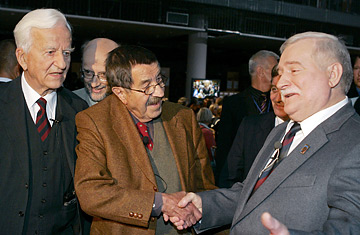
Former Polish President Lech Walsea and Nobel Prize winner Gunter Grass shake hands with former German President Richard von Weizsaecker before a debate in Grass's native city of Gdansk, Poland.
But when Grass confessed that, as a teenager in the closing months of World War II, he had joined the Waffen SS, Walesa was a prominent critic, demanding that the German writer be stripped of his honorary citizenship of the city. Now, a year later, Grass is being welcomed back to Gdansk with a series of performances, readings and panel discussions to mark his 80th birthday — and Walesa is among those welcoming him.
In an interview with TIME, Walesa explained his change of heart: Because his own father was killed while fleeing the Germans, he said, he had little tolerance for "that generation." But in figures such as Grass, "we see examples of those who are helping us pass from a hostile period to a period of peace."
Grass, for his own part, said he was happy to be back in the city of his birth to "spend time with friends." He said he was grateful to the city fathers for being understanding of his troubles, and for deciding to reach out to him despite the criticism he faced in many quarters. "In those difficult days, it was a great help for me," he said Thursday. "I felt cornered and then I got this signal of tolerance and openness from my home town."
In his memoir, Peeling the Onion, which was published in Germany last year and in the U.S. this summer, Grass revealed for the first time that, after joining the armed forces at age 16 in the fall of 1944, he was drafted into the SS, the fanatical branch of Adolf Hitler's army —although by the time he took up arms, the war was all but over. (He writes, credibly, that he never actually fired a shot.) Grass's memoir describes in detail the conditions he encountered in the chaotic retreat before the advancing Red Army in the closing months of the war. But the revelation of his SS affiliation came as a shock to Grass's admirers in Germany and elsewhere, because he had so unstintingly criticized his fellow Germans for failing to confront their culpability in the Nazi era.
In Poland, where relations with Germany have rarely been cordial and where ties have deteriorated in recent years, the news was seized on by leading right-wing politicians to condemn him. Grass last year wrote Walesa and the mayor of Gdansk, Pawel Adamwicz, to explain why he had taken so long to admit the full details of his war record. He said it had taken him until his later years to find the right formula to discuss his decision. "It's only now, with age, that I have found a suitable way of talking about it from a wider perspective," he wrote. Mayor Adamowicz, who later admitted that he had agonized over what he would do if Grass failed to find the right words to apologize, accepted the explanation unreservedly. Walesa told TIME this week that Grass, in his view, is helping bridge the gap between generations.
"My father was murdered, not directly but effectively, by the Germans. So I don't feel sympathy for that generation," he said. "But I am a realist. The world has changed. From the period of wars, borders and communism we are passing to the period of ideas , information and globalization. A generation is passing from that one to this one — and Grass, he said, is helping int that transition.
On Thursday, the German author of The Tin Drum and other novels walked through the streets of the old Hanseatic League town and met with Walesa in the evening. Residents crowded the route and many appeared anxious to welcome him back . One of those greeting him was Gdansk novelist Pawel Huelle, who praised the German writer for his intellectual contributions as well as for his frequent public statements that Germany had no claim on lands lost to Poland in the war. "For all his life Grass has been against erasing memory, erasing history and putting responsibility just on history and Adolf Hitler," Huelle wrote in the daily Gazeta Wyborcza. "His analysis of fascism and German crimes have always showed that it wasn't a devil that tempted Germans but ordinary people who for their benefit accepted step by step the escalation of evil and violence."
The visit has certainly prompted widespread commentary in Poland. Gazeta Wyborcza editor and celebrated anti-communist dissident Adam Michnik penned this birthday greeting: "Grass teaches how to love freedom and truth or, simply put, life, how to love people how to love literature, he can do it, and we love you!"
Not everyone shares Michnik's appreciation of Grass. One nationalist newspaper columnist called Grass a "cheater," while deputies with the ruling nationalist Law and Justice Party boycotted the Gdansk celebration and decried the $100,000 spent by the city on the event. The ruling party led by the twins Lech and Jaroslaw Kaczynski, which faces the voters two weeks from now, has stressed Poland's suffering at the hands of Germany during the war, and relations between the two countries have chilled during their two years in power. But Gdansk appears more willing to both remember and forgive.
